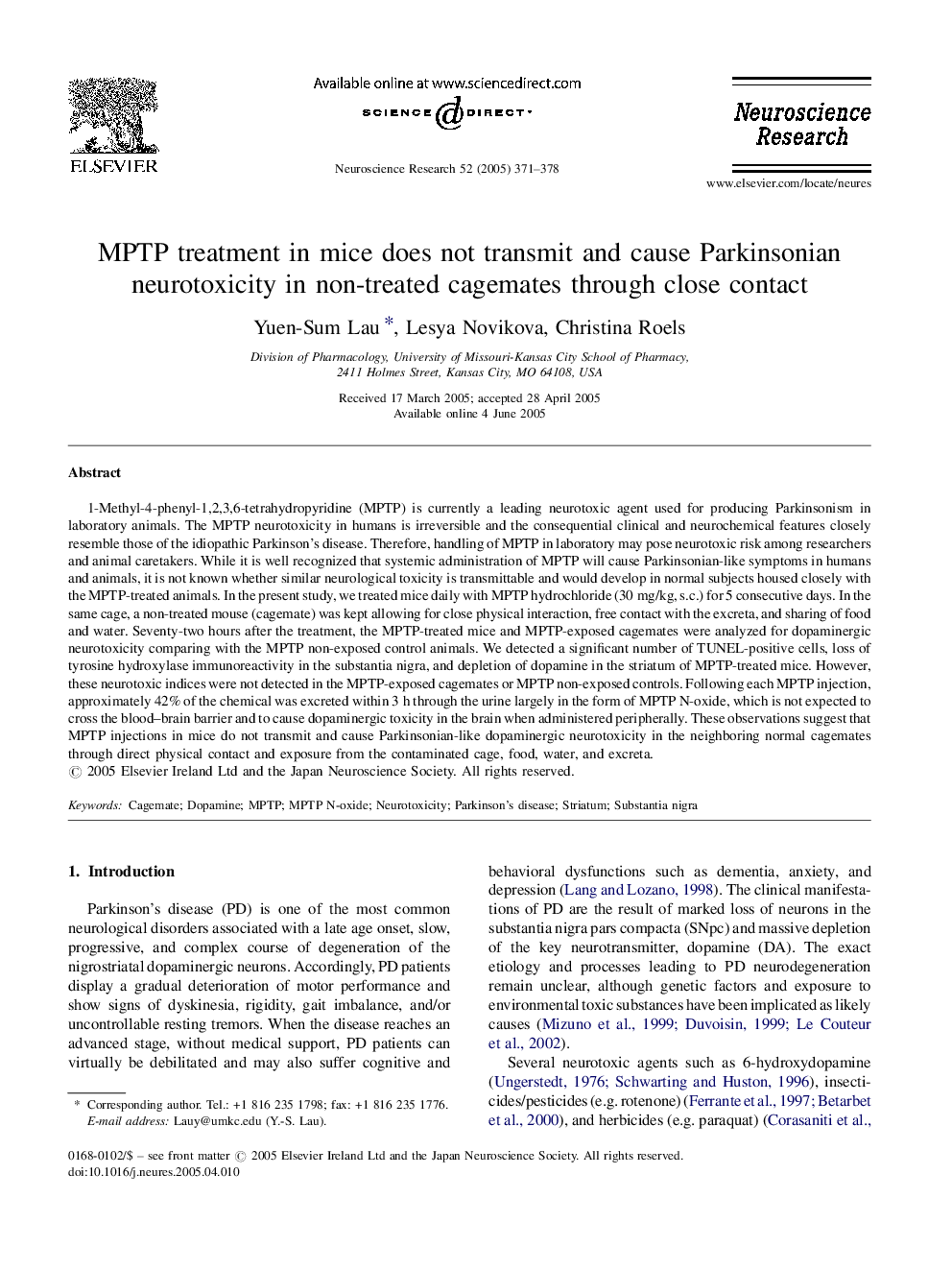| کد مقاله | کد نشریه | سال انتشار | مقاله انگلیسی | نسخه تمام متن |
|---|---|---|---|---|
| 9434387 | 1298147 | 2005 | 8 صفحه PDF | دانلود رایگان |
عنوان انگلیسی مقاله ISI
MPTP treatment in mice does not transmit and cause Parkinsonian neurotoxicity in non-treated cagemates through close contact
دانلود مقاله + سفارش ترجمه
دانلود مقاله ISI انگلیسی
رایگان برای ایرانیان
کلمات کلیدی
موضوعات مرتبط
علوم زیستی و بیوفناوری
علم عصب شناسی
علوم اعصاب (عمومی)
پیش نمایش صفحه اول مقاله

چکیده انگلیسی
1-Methyl-4-phenyl-1,2,3,6-tetrahydropyridine (MPTP) is currently a leading neurotoxic agent used for producing Parkinsonism in laboratory animals. The MPTP neurotoxicity in humans is irreversible and the consequential clinical and neurochemical features closely resemble those of the idiopathic Parkinson's disease. Therefore, handling of MPTP in laboratory may pose neurotoxic risk among researchers and animal caretakers. While it is well recognized that systemic administration of MPTP will cause Parkinsonian-like symptoms in humans and animals, it is not known whether similar neurological toxicity is transmittable and would develop in normal subjects housed closely with the MPTP-treated animals. In the present study, we treated mice daily with MPTP hydrochloride (30Â mg/kg, s.c.) for 5 consecutive days. In the same cage, a non-treated mouse (cagemate) was kept allowing for close physical interaction, free contact with the excreta, and sharing of food and water. Seventy-two hours after the treatment, the MPTP-treated mice and MPTP-exposed cagemates were analyzed for dopaminergic neurotoxicity comparing with the MPTP non-exposed control animals. We detected a significant number of TUNEL-positive cells, loss of tyrosine hydroxylase immunoreactivity in the substantia nigra, and depletion of dopamine in the striatum of MPTP-treated mice. However, these neurotoxic indices were not detected in the MPTP-exposed cagemates or MPTP non-exposed controls. Following each MPTP injection, approximately 42% of the chemical was excreted within 3Â h through the urine largely in the form of MPTP N-oxide, which is not expected to cross the blood-brain barrier and to cause dopaminergic toxicity in the brain when administered peripherally. These observations suggest that MPTP injections in mice do not transmit and cause Parkinsonian-like dopaminergic neurotoxicity in the neighboring normal cagemates through direct physical contact and exposure from the contaminated cage, food, water, and excreta.
ناشر
Database: Elsevier - ScienceDirect (ساینس دایرکت)
Journal: Neuroscience Research - Volume 52, Issue 4, August 2005, Pages 371-378
Journal: Neuroscience Research - Volume 52, Issue 4, August 2005, Pages 371-378
نویسندگان
Yuen-Sum Lau, Lesya Novikova, Christina Roels,